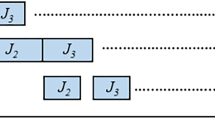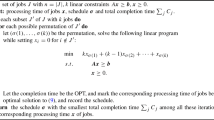Abstract
In this paper, the problem of hybrid flow shop scheduling with common due dates (HFSCDD) is studied, and the objectives are to minimize the total waiting time and the total earliness/tardiness issues that arise. This study was motivated by a real-life shop floor, with the predefined goal of meeting the requirements of the final product in many manufacturing industries. Where the final product is assembled from multiple components and, the assembly is only initiated when all components of the product are complete in number. These interrelated components have common due dates. In this study, we developed a mathematical model of HFSCDD which made up of “n” jobs that were processed in “m” machines, located on “I” stages by taking into consideration the common due dates. This problem is classified as being NP-hard, and so an efficient modified genetic algorithm is developed to solve it. The proposed modify GA is developed based on the NSGA II method for large sized problems. The results of the proposed algorithm have been compared with PSO and GA algorithms and showed that the proposed algorithm achieved better performance than existing solutions, since the waiting time and the earliness/tardiness are significantly reduced. This is facilitated by the simultaneous production of components for the same product.






Similar content being viewed by others
References
Asefi H, Jolai F, Rabiee M, Araghi MT (2014) A hybrid NSGA-II and VNS for solving a bi-objective no-wait flexible flowshop scheduling problem. Int J Adv Manuf Technol 75:1017–1033
Azizi A, Vatankhah Barenji A, Hashmipour M (2016) Optimizing radio frequency identification network planning through ring probabilistic logic neurons. Adv Mech Eng 8:1687814016663476
Barenji AV (2013) An RFID-based distributed control system for flexible manufacturing system. Eastern Mediterranean University (EMU)-Doğu Akdeniz Üniversitesi (DAÜ)
Barenji AV, Barenji RV, Hashemipour M (2016) Flexible testing platform for employment of RFID-enabled multi-agent system on flexible assembly line. Adv Eng Softw 91:1–11
Barenji AV, Barenji RV, Roudi D, Hashemipour M (2017) A dynamic multi-agent-based scheduling approach for SMEs. Int J Adv Manuf Technol 89:3123–3137
Cheng R, Gen M, Tsujimura Y (1999) A tutorial survey of job-shop scheduling problems using genetic algorithms, part II: hybrid genetic search strategies. Comput Ind Eng 36:343–364
Coello CAC, Lamont GB, Van Veldhuizen DA (2007) Evolutionary algorithms for solving multi-objective problems. Springer, New York
Deb K, Pratap A, Agarwal S, Meyarivan T (2002) A fast and elitist multiobjective genetic algorithm: NSGA-II. IEEE Trans Evol Comput 6:182–197
Eberhart R, Kennedy J (1995) A new optimizer using particle swarm theory. In: Proceedings of the Sixth International Symposium on Micro Machine and Human Science, 1995 MHS’95, IEEE, pp 39–43
Engin O, Ceran G, Yilmaz MK (2011) An efficient genetic algorithm for hybrid flow shop scheduling with multiprocessor task problems. Appl Soft Comput 11:3056–3065
Figielska E (2014) A heuristic for scheduling in a two-stage hybrid flowshop with renewable resources shared among the stages. Eur J Oper Res 236:433–444
Grabowski J, Pempera J (2000) Sequencing of jobs in some production system. Eur J Oper Res 125:535–550
Gupta JN (1988) Two-stage, hybrid flowshop scheduling problem. J Oper Res Soc 39:359–364
Hidri L (2016) Note on the hybrid flowshop scheduling problem with multiprocessor tasks. Int J Prod Econ 182:531–534
Iyer SK, Saxena B (2004) Improved genetic algorithm for the permutation flowshop scheduling problem. Comput Oper Res 31:593–606
Jun S, Park J (2015) A hybrid genetic algorithm for the hybrid flow shop scheduling problem with nighttime work and simultaneous work constraints: a case study from the transformer industry. Expert Syst Appl 42:6196–6204
Kim Y-D, Joo B-J, Shin J-H (2009) Heuristics for a two-stage hybrid flowshop scheduling problem with ready times and a product-mix ratio constraint. J Heuristics 15:19–42
Lei D, Guo X (2016) Hybrid flow shop scheduling with not-all-machines options via local search with controlled deterioration. Comput Oper Res 65:76–82
Li D, Meng X, Liang Q, Zhao J (2015) A heuristic-search genetic algorithm for multi-stage hybrid flow shop scheduling with single processing machines and batch processing machines. J Intell Manuf 26:873–890
Liang F, Fung RY (2016) Coordination mechanism in real-time scheduling of virtual cellular manufacturing systems. Proc Inst Mech Eng Part B J Eng Manuf 230:534–547
Linn R, Zhang W (1999) Hybrid flow shop scheduling: a survey. Comput Ind Eng 37:57–61
Luo H, Du B, Huang GQ, Chen H, Li X (2013) Hybrid flow shop scheduling considering machine electricity consumption cost. Int J Prod Econ 146:423–439
Meng T, Pan Q-K, Li J-Q, Sang H-Y (2017) An improved migrating birds optimization for an integrated lot-streaming flow shop scheduling problem. Swarm Evolut Comput 38:64–78
Murugan P, Kannan S, Baskar S (2009) NSGA-II algorithm for multi-objective generation expansion planning problem. Electr Power Syst Res 79:622–628
Naderi B, Ruiz R, Zandieh M (2010) Algorithms for a realistic variant of flowshop scheduling. Comput Oper Res 37:236–246
Pan Q-K, Wang L, Mao K, Zhao J-H, Zhang M (2013) An effective artificial bee colony algorithm for a real-world hybrid flowshop problem in steelmaking process. IEEE Trans Autom Sci Eng 10:307–322
Pan Q-K, Wang L, Li J-Q, Duan J-H (2014) A novel discrete artificial bee colony algorithm for the hybrid flowshop scheduling problem with makespan minimisation. Omega 45:42–56
Pan Q-K, Gao L, Li X-Y, Gao K-Z (2017) Effective metaheuristics for scheduling a hybrid flowshop with sequence-dependent setup times. Appl Math Comput 303:89–112
Rabiee M, Rad RS, Mazinani M, Shafaei R (2014) An intelligent hybrid meta-heuristic for solving a case of no-wait two-stage flexible flow shop scheduling problem with unrelated parallel machines. Int J Adv Manuf Technol 71:1229–1245
Rahimi-Vahed A, Dangchi M, Rafiei H, Salimi E (2009) A novel hybrid multi-objective shuffled frog-leaping algorithm for a bi-criteria permutation flow shop scheduling problem. Int J Adv Manuf Technol 41:1227–1239
Ruiz R, Vázquez-Rodríguez JA (2010) The hybrid flow shop scheduling problem. Eur J Oper Res 205:1–18
Sha D, Lin H-H (2010) A multi-objective PSO for job-shop scheduling problems. Expert Syst Appl 37:1065–1070
Shi Y, Eberhart RC (1999) Empirical study of particle swarm optimization. In: Proceedings of the 1999 congress on Evolutionary computation, 1999 CEC 99. IEEE, pp 1945–1950
Solimanpur M, Elmi A (2011) A tabu search approach for group scheduling in buffer-constrained flow shop cells. Int J Comput Integr Manuf 24:257–268
Srinivas N, Deb K (1994) Muiltiobjective optimization using nondominated sorting in genetic algorithms. Evol Comput 2:221–248
Tavakkoli-Moghaddam R, Rahimi-Vahed A, Mirzaei AH (2007) A hybrid multi-objective immune algorithm for a flow shop scheduling problem with bi-objectives: weighted mean completion time and weighted mean tardiness. Inf Sci 177:5072–5090
Thuerer M, Stevenson M, Silva C, Land M, Filho MG (2013) Workload control and order release in two-level multi-stage job shops: an assessment by simulation. Int J Prod Res 51:869–882
Vatankhah Barenji A, Vatankhah BR (2017) Improving multi-agent manufacturing control system by indirect communication based on ant agents. Proc Inst Mech Eng Part I J Syst Control Eng 231:447–458
Wang X, Tang L (2009) A tabu search heuristic for the hybrid flowshop scheduling with finite intermediate buffers. Comput Oper Res 36:907–918
Wang S-Y, Wang L, Liu M, Xu Y (2015) An order-based estimation of distribution algorithm for stochastic hybrid flow-shop scheduling problem. Int J Comput Integr Manuf 28:307–320
Zhang B, Q-K Pan, Gao L, X-l Zhang, Sang H-Y, Li J-Q (2017) An effective modified migrating birds optimization for hybrid flowshop scheduling problem with lot streaming. Appl Soft Comput 52:14–27
Zhou J, Yao X (2017) A hybrid artificial bee colony algorithm for optimal selection of QoS-based cloud manufacturing service composition. Int J Adv Manuf Technol 88:3371–3387
Acknowledgements
The authors would like to acknowledge that the project was supported by the National Science Foundation of China (Nos. 71501187, 51405089) and the grant from the Humanities and Social Sciences Foundation of the Ministry of Education in China (No. 14YJC630179), and also, the Pearl River S&T Nova Program of Guangzhou (No. 201710010004). Post-doctoral foundation (XXX)
Author information
Authors and Affiliations
Corresponding author
Additional information
Publisher's Note
Springer Nature remains neutral with regard to jurisdictional claims in published maps and institutional affiliations.
Rights and permissions
About this article
Cite this article
Li, Z., Zhong, R.Y., Barenji, A.V. et al. Bi-objective hybrid flow shop scheduling with common due date. Oper Res Int J 21, 1153–1178 (2021). https://doi.org/10.1007/s12351-019-00470-8
Received:
Revised:
Accepted:
Published:
Issue Date:
DOI: https://doi.org/10.1007/s12351-019-00470-8




